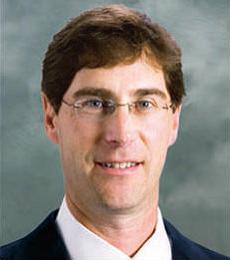Michael Nash, MBA '89
Senior Managing Director and Chief Investment Officer, The Blackstone Group

Mike Nash, senior managing director and chief investment officer for real estate debt strategies at The Blackstone Group, joined that firm in 2007 to launch its high-yield real estate debt investment business. As the markets were melting down, it was a fortuitous moment for his debut, he said: “The crisis created an unprecedented investment environment, which is all you can ever ask for as you launch a new business.”
Nash’s interest in real estate was sparked at Stern. “I was working at Deloitte and going to Stern part time, and I took some real estate finance classes as part of my MBA,” he recalled. “The whole MBA experience was a chance to find a new passion and pursue it. The light switch went on at that time, and when I left Stern I interviewed for jobs within the real estate industry, landing at Bank of Nova Scotia to do real estate financing. Without exposure to the industry through Stern, I might have pursued a different path.”
Since his start in 1989, the industry has gone through “a bit of a revolution,” Nash observed. With the emergence of debt and equity capital markets in the early 1990s, firms have been able to grow dramatically. Over the same period, offshore investors increased their activity in the US and Europe, much as US firms invested globally. Technology has turbocharged the whole process. “Today, a wealth of previously inaccessible information is available to market participants,” Nash said.
Nash is optimistic about the outlook for real estate. Despite the obvious risk, he explained, fundamentals are improving. Over the past few years, he explained, with new supply curtailed and modest economic growth, property markets are stabilizing and pricing is improving. Also, values are still relatively low. Meantime, capital is seeking yield and is attracted to real estate as an income-producing, hard-asset class.
“As a lender to commercial real estate, we like markets where people will pay a premium for the liquidity we provide,” Nash said. “It’s a little old school, but if you treat people well, act with high integrity, and always deliver on a promise, you’ll do well regardless. In our business, the recession and continued volatility make that more relevant than ever.”
Nash’s interest in real estate was sparked at Stern. “I was working at Deloitte and going to Stern part time, and I took some real estate finance classes as part of my MBA,” he recalled. “The whole MBA experience was a chance to find a new passion and pursue it. The light switch went on at that time, and when I left Stern I interviewed for jobs within the real estate industry, landing at Bank of Nova Scotia to do real estate financing. Without exposure to the industry through Stern, I might have pursued a different path.”
Since his start in 1989, the industry has gone through “a bit of a revolution,” Nash observed. With the emergence of debt and equity capital markets in the early 1990s, firms have been able to grow dramatically. Over the same period, offshore investors increased their activity in the US and Europe, much as US firms invested globally. Technology has turbocharged the whole process. “Today, a wealth of previously inaccessible information is available to market participants,” Nash said.
Nash is optimistic about the outlook for real estate. Despite the obvious risk, he explained, fundamentals are improving. Over the past few years, he explained, with new supply curtailed and modest economic growth, property markets are stabilizing and pricing is improving. Also, values are still relatively low. Meantime, capital is seeking yield and is attracted to real estate as an income-producing, hard-asset class.
“As a lender to commercial real estate, we like markets where people will pay a premium for the liquidity we provide,” Nash said. “It’s a little old school, but if you treat people well, act with high integrity, and always deliver on a promise, you’ll do well regardless. In our business, the recession and continued volatility make that more relevant than ever.”
